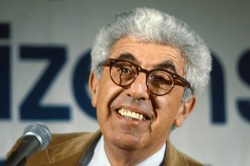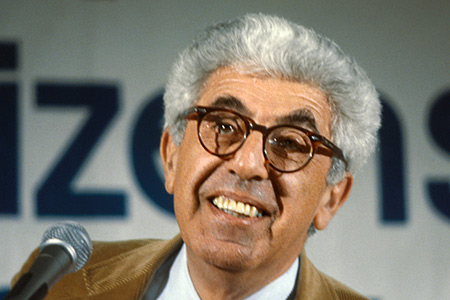
Ron Kuntz / Bettmann / Corbis / APBarry Commoner acknowledges cheers of delegates after accepting the Citizens’ Party’s nomination for president, April 13, 1980.
OK, folks, here are the rules:
- Everything is connected to everything else.
- Everything must go somewhere.
- Nature knows best.
- There is no such thing as a free lunch.
Any questions?
If you’ve ever taken an ecology class, you may remember these as the “four laws of ecology,” coined by one of the field’s founders, Barry Commoner, who died yesterday at the ripe old age of 95.
Commoner is known for his willingness to speak out against environmental ills that science showed to be ecologically damaging — but he didn’t stop there: In an era when the environmental movement was increasingly focused on fighting pollution and protecting wild places, Commoner argued that environmental struggles were inseparable from social concerns, including civil and women’s rights (see Rule No. 1). He was also a staunch advocate for consumer rights.
Here’s his obituary today in The New York Times:
Raised in Brooklyn during the Depression and trained as a biologist at Columbia and Harvard, he came armed with a combination of scientific expertise and leftist zeal. His work on the global effects of radioactive fallout, which included documenting concentrations of strontium 90 in the baby teeth of thousands of children, contributed materially to the adoption of the Nuclear Test Ban Treaty of 1963 …
In 1970, the year of the first Earth Day, Time magazine put Dr. Commoner on its cover and called him the Paul Revere of Ecology. He was by no means the only one sounding alarms — the movement was well under way by then, building on the impact of Rachel Carson’s book “Silent Spring” in 1962 and the work of many others. But he was arguably the most peripatetic in his efforts to make environmentalism a people’s political cause.
“He was a giant, a true hero,” says Robert Bullard, dean of the school of public affairs at Texas Southern University in Houston, who is widely considered to be the father of environmental justice. “People respected him for his science, but also his activism. He proved that you can make policy changes based on your research and your principles.”
In addition to his work on nuclear fallout, Commoner took umbrage with scientific models that look at the impacts of pollution on human health, and set levels of “acceptable risk.” “The scientists were pretty attached to their model — you assign a number to the risk and a value to health and life,” Bullard says. Commoner suggested that they needed to take into account moral and ethical considerations as well — and in doing so, he laid the groundwork for people like Bullard, who have challenged this type of “quantitative risk assessment.”
“When environmental justice started to emerge — putting health at the center, and civil rights — it was an easy sell to Commoner,” Bullard says.
Michael Soulé, known by many as the founder of conservation biology, remembers Commoner as “one of the most activist scientists of his generation.” While activism has become somewhat more acceptable in some scientific circles (conservation biology is based on the premise that you can use science to set the world right), Soulé says it is still rare. “I can count those that combine activism with good, respectable science on one hand or two hands,” he says.
In 1993, Commoner explained to the Chicago Tribune that “the Atomic Energy Commission turned me into an environmentalist.” He had raised alarms about the levels of radioactive material in the atmosphere after atomic bomb tests, but officials brushed him off. From that point on, he would become a vocal advocate for people’s right to know about toxins in the environment and in the products they bought. Here’s historian Peter Dreier in an obit on HuffPo:
Commoner insisted that scientists had an obligation to make scientific information accessible to the general public, so that citizens could participate in public debates that involved scientific questions. Citizens, he said, have a right to know the health hazards of the consumer products and technologies used in everyday life. Those were radical ideas in the 1950s and 1960s, when most Americans were still mesmerized by the cult of scientific expertise and such new technologies as cars, plastics, chemical sprays, and atomic energy.
Commoner’s views did get him cross-wise with other scientists and environmentalists — including Stanford biologist Paul Ehrlich, author of the iconic 1968 book The Population Bomb, which warned of the dangers of too many humans on the planet. Commoner argued that the fundamental problem wasn’t so much the number of people, but the consumer culture of the developed world. Ehrlich recalls a comment Commoner made to President Nixon’s panel on population in 1970. “He said, ‘When a ship is sinking, Ehrlich would like to throw the passengers overboard.’ My response was, ‘If the ship is sinking and it’s still tied to the dock, maybe it’s a good idea to make sure no more passengers get on board.'”
Aside from the population debate, Ehrlich says he and Commoner saw eye to eye on many things, and besides, “It’s always nice to have an opponent around.” He adds that Commoner’s belief that social and scientific issues are inseparable — back to Rule No. 1 here — was also right on. “The scientific community knows more than enough about where we’re going in the world,” Ehrlich says. “I’ve spent the last 20 years of my life trying to persuade social scientists to address the question of why we’re not doing anything about it.” (Listen to a recent interview with Ehrlich here.)
In a year when climate change, perhaps the biggest issue facing humanity, is hardly getting a mention in the presidential race, it’s a question that is relevant for political science as well.
More than three decades ago, in 1980, Commoner tried to force similar, looming questions into the presidential contest. He jumped in himself, as a candidate for his own Citizens’ Party. That went over like a lead balloon, as you might imagine, but as the Times recounts, he would always remember one question he got from a reporter in Albuquerque:
“Dr. Commoner, are you a serious candidate, or are you just running on the issues?”
Clearly, we could use a few more Barry Commoners around today.



